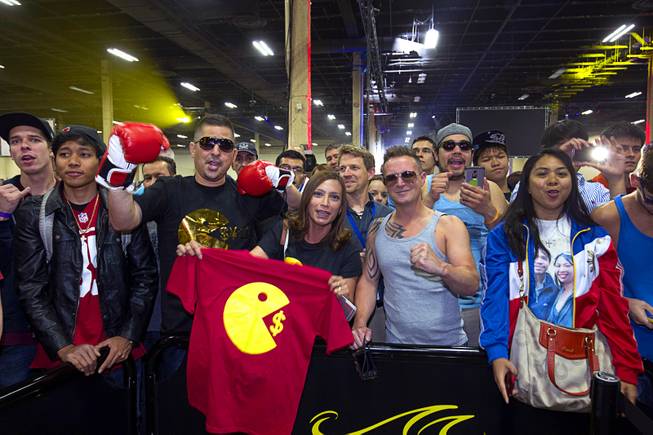
Manny Pacquiao fans wait for the start of a fan rally at the Mandalay Bay Tuesday, April 28, 2015. WBO welterweight champion Manny Pacquiao of the Philippines will face undefeated WBC/WBA welterweight champion Floyd Mayweather Jr. of the U.S. in a welterweight unification bout on May 2, 2015 at the MGM Grand Garden on Saturday.
Friday, May 1, 2015 | 2 a.m.
Boxing has long been dismissed as a niche sport whose withering popularity relies largely on a diehard, minority-heavy fan base.
But today, it's basking in a rare limelight cast by this weekend’s much-hyped celebrity bout between longtime rivals Floyd Mayweather Jr. and Manny Pacquiao. And its followers — mainly Latino, black and Asian fans — are also reaping some benefits from pugilism’s reintroduction to mainstream culture.
Some boxing personalities and fans are even hopeful the match will trigger a return to the sport’s heyday.
“We’re seeing a sports renaissance,” Showtime boxing analyst Al Bernstein said. “Other boxers don’t get covered by mainstream sports media, but people want to see these men fight.”
Boxing is an identity-driven sport, and Saturday’s fight pits two highly polarizing, hugely popular fighters with similar rags-to-riches stories but vastly different cultural backgrounds and personalities.
While the racial makeup of their respective fan bases is mixed (sports experts say fans tend to follow boxers based on personality rather than racial identity), Filipino fans tend to follow Pacquiao — a national icon in the Philippines, his home country — and black fans traditionally side with Mayweather.
“Boxing, classically, is the most directly aggressive sport in the United States, and it's a demonstration of a kind of physical superiority through power, though endurance, though intellect,” said Daniel Durbin, director of the Institute of Sports, Media and Society at the University of California. “As you identify with a boxer, you can identify with them representing yourself or representing your community.”
The upcoming match has cultural relevance for its many fans of color.
Robert Macabagdal, a Las Vegas-based journalist with the Filipino-American newspaper Asian Journal, says Pacquiao’s role in the prizefight elevates that community’s presence in the American mainstream.
Already a beloved icon in his native country, Pacquiao has been labeled the hero in Saturday’s fight thanks in large part to his civic engagement and Mayweather’s brash style.
“I think Manny being in the news has uplifted our name,” Macabagdal said. “I think it’s a good thing that he’s giving Filipinos an identity. Right now, all the Filipinos in Hollywood are mixed race, and this is the first pure Filipino that is beloved by all cultures around the world. Manny gives a face to being a Filipino. That’s how big I think of him, that’s how big I think he is.”
Even Mayweather backers say the fight has special significance to them. One visitor from Kansas City, Mo., said it was refreshing to see a successful black athlete prominently mentioned in the media after months of bad news about racial tensions between police and young black men in her home state.
“A lot of people don’t like him because the media highlights a lot of bad things about him, but he gives back a lot, too,” said Christina Jenkins, who visited Las Vegas to watch the fight with her husband at the Mirage. “It’s great to see how diverse this event is. It's just amazing to me. It’s going to draw people from not just the African-American community but others, too, and hopefully it will spark up the interest back into boxing.”
Yet despite the sport's resurgence thanks to this weekend's mega-bout, boxing will likely never relive its golden age. And that has a lot to do with race.
The sport owes much of its success during that era to segregation. Tension among blacks and whites fueled boxing’s popularity during its peak period, generally considered to be between the 1890s and 1960s. At the time, fights were a venue to argue the country’s racial conflicts.
“Promoters wanted to see white men pummel blacks,” said Mark Padoongpatt, a UNLV professor who specializes in ethnic studies. “So when we had successful black boxers, it helped the status of the race and showed they were equal to whites in the U.S.”
Boxing doesn’t have the gravitas or the fan base it once did. But as the sport’s popularity has dwindled, a growing legion of minorities in the U.S. has conversely filled that growing void. Just a decade ago, more than 80 percent of its American fans were white. As of 2013, more than half were Latino, black or Asian.
Hype around the so-called "fight of the century," though, unites fans from all backgrounds.
"This is not just a black and Asian thing," said Derek Rodarte, a Los Angeles-based artist who visited the Strip to sell his fight-themed merchandise. "Everyone wants to be a superhero."

Join the Discussion:
Check this out for a full explanation of our conversion to the LiveFyre commenting system and instructions on how to sign up for an account.
Full comments policy